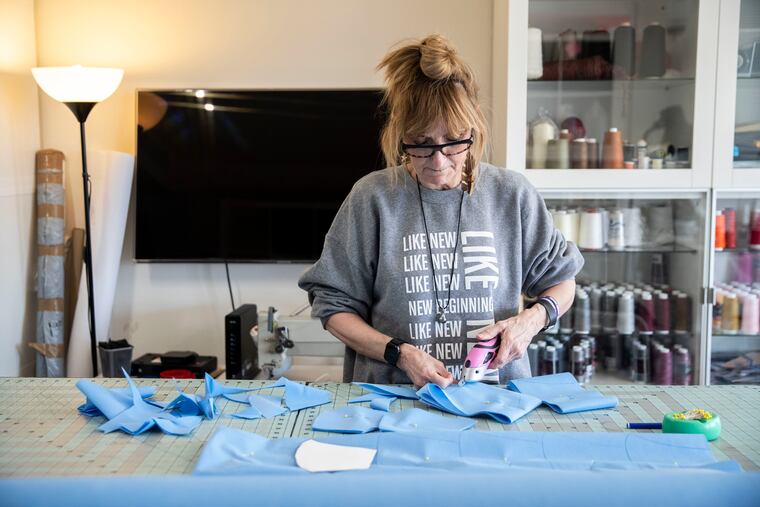Philly fashion designers pivot to face masks to protect health-care workers from COVID-19
Wednesday marked the beginning of CoverAidPHL, a task force of more than 2,000 Philadelphia-based designers and sewers willing to make protective masks for caretakers — food service workers, orderlies, health aids — who work in the heathcare profession.

If there is one thing Season 18 Project Runway finalist Nancy Volpe Beringer can do, it’s sew.
That is why when she learned last week that it was very likely that Pennsylvania’s first responders would not have the critical protective masks needed to care for the sick and protect them from contracting COVID-19, she jumped into action.
She researched and found an online pattern, went shopping for cotton at Fleishman Fabrics, ordered elastic, and started sewing.
“I have about 150 masks in the works,” Beringer said. “If I go full speed, I can get them sewn in about five minutes.”
“Philadelphia is a city of makers”
Beringer was by no means working in a vacuum. On Saturday, Dawn Summerville, the deputy commerce director for the city of Philadelphia, reached out to Philadelphia Fashion Incubator executive director Elissa Bloom for the names of local designers who would be willing to help make masks.
On Wednesday, CoverAidPHL launched. The task force is galvanizing more than 2,000 Philadelphia-based designers and sewers including Beringer willing to make protective masks for caretakers — food service workers, orderlies, health aids — who work in the health-care profession. The task force is also working hard to connect the local health industry with manufacturers are willing to make the masks.
“The design community is reacting and we are all realizing that we can’t leave this up to the [federal] government,” Bloom said. “Philadelphia is a city of makers. That’s what Philly is about. People saw the need and wanted to help.”
The designers include a mix of Fashion Incubator designers-in-residence (both past and present) and members of Sew Face Masks Philadelphia, a Facebook group started by Nicole Jochym, a third-year medical school student at Rowan University’s Cooper Medical School. All of the sewers are volunteers, so no one will get paid for their work. At least not yet. But Bloom is advocating for compensation, especially because the task force aims to make tens of thousands of masks.
“I am hoping that someone will step forward who has the ability to provide compensation as these workers have families to support and rents to pay," Bloom said. “They are skilled artisans who deserve to be paid.”
Where the masks are needed
The mask shortage is scary. Over the past week, first responders in New Jersey were told to buy painters’ masks to protect themselves, and the Pennsylvania Department of Health was reaching out to the mining industry for masks. Last week, the U.S. Centers for Disease Control and Prevention started recommending homemade face masks as a “crisis response” option for health-care workers, saying that items such as bandannas and scarves could be used as a “last resort” in place of more official gear like surgical masks.
The masks the designers are making are not the N95 masks recommended for front-line health-care professionals by the CDC. N95s are the coveted thin, polymer cups capable of filtering out 95 percent of airborne particles, and can protect a wearer from the inadvertent COVID-19-laden sneeze or cough.
CoverAidPHL masks will be fashioned from a T-shirt material that is a 50/50 blend of cotton polyester and knit jersey, explained Evan Malone, a task force member and owner of NextFab, a co-working space that supports local makers. The idea behind the efforts, Malone said, is that, “when there is nothing else, anything is better than nothing."
As of now, Bloom said, there are calls for their masks at Liberty Lutheran, a senior living community with locations in Ambler, Bala Cynwyd, and State College, as well as Bayada Home Healthcare’s Philadelphia location. Malone says he’s working on providing the masks to more Philadelphia health-care facilities, including hospitals.
Industry hit hard by shutdown
The fashion and beauty industry — especially local makers and specialty retailers — have been hit particularly hard thanks to the businesses that have closed due to the coronavirus outbreak.
Companies like Urban Outfitters evoked their “force majeure" clause canceling orders from designers and makers. And HeyDay, a New York-based facial bar that opened its doors in Center City last year, let go its staff of skin therapists, hosts, and shop attendants.
This week, Valley Forge-bred Tory Burch announced an effort by the fashion community to petition the federal government for a bailout, much like what the airline industry is looking for.
“Fashion is not a lightweight industry,” Burch told CNN. “It’s about putting Americans to work and keeping Americans in the work force.”
In the meantime, Bloom said she’s happy the hard-hit fashion community continues to be inspired to help.
“We mobilized so fast,” Bloom said. “We want to be there for our health-care workers. We feel like we answered the call when others hadn’t."
For more information, log on to https://coveraidphl.org/